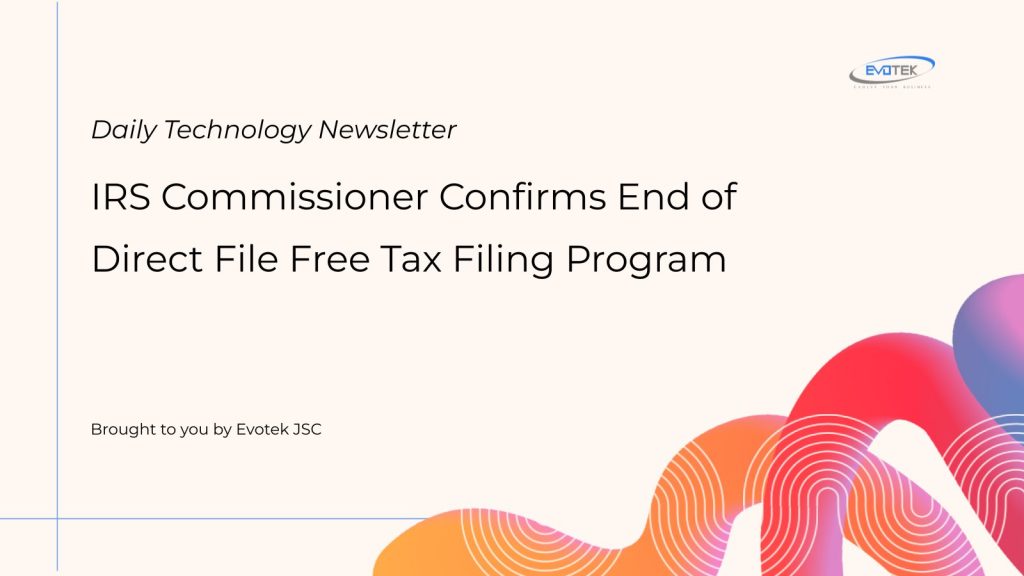Internal Revenue Service (IRS) Commissioner Bill Long has announced the agency’s decision to terminate its Direct File program. This move comes after a limited pilot phase and one full filing season, signaling a significant shift in the landscape of free tax preparation options for American taxpayers.
The program’s cessation is reportedly enshrined within President Donald Trump’s extensive spending and policy bill. This legislation includes provisions for funding research to “replace any direct e-file programs run by the Internal Revenue Service.” Commissioner Long, speaking at a tax professional summit on July 28, emphatically stated that Direct File is already “gone.”
Commissioner’s Stance: “I Care About Direct Audit”
During the summit, Long’s comments left little room for ambiguity regarding his perspective on the program. “You’ve heard of Direct File, that’s gone,” he declared, adding, “Big beautiful Billy wiped that out. I don’t care about Direct File. I care about direct audit.” This statement suggests a clear redirection of agency focus, moving away from direct government-provided filing services towards enhanced compliance and oversight.
Despite the Commissioner’s definitive remarks, the IRS itself has yet to issue a comprehensive official confirmation on the program’s ultimate future. An IRS spokesperson told CNBC Make It that Commissioner Long is dedicated to modernizing the agency and enhancing the taxpayer experience, which includes greater transparency regarding tax return and audit statuses. The agency anticipates the Treasury Department’s forthcoming report to Congress, which will detail findings on the Direct File program and explore potential public-private partnership alternatives, as mandated by the new legislation.
Understanding the Direct File Program
The Direct File program offered a streamlined, free filing solution for taxpayers in specific states with straightforward tax situations, allowing them to submit returns directly to the IRS. Launched as a pilot in 12 states in 2024, it expanded to an additional 13 states in 2025. The Treasury Department estimated that up to 30 million Americans were eligible to utilize this option for the 2025 tax season.
While the program aimed to simplify tax filing for millions, it faced significant political opposition. Some Republicans criticized Direct File as a wasteful endeavor and an overreach of federal government power. Reports from the Associated Press in April indicated that the Trump administration had plans to discontinue the program even before the introduction of the new comprehensive policy bill.
Despite the political headwinds, the program garnered high user satisfaction. An internal IRS report, obtained by Nextgov/FCW, revealed that nearly 300,000 filers successfully used Direct File for the 2025 tax season. Crucially, 94% of users who completed an IRS survey rated their experience as “excellent” or “above average.” For taxpayers who filed an extension for their 2024 taxes, the IRS has confirmed that Direct File remains accessible until the October 15 deadline.
Continuing Free Tax Filing Options for Taxpayers
Even with the impending discontinuation of Direct File, taxpayers still have various avenues for filing their taxes at no cost. The IRS offers several established programs that facilitate free tax preparation:
- IRS Free File Program: This initiative partners the IRS with third-party tax preparation software companies, providing free services to eligible taxpayers. Eligibility requirements often vary based on adjusted gross income (AGI) and state of residence. Taxpayers can utilize the IRS’s questionnaire tool to identify an applicable partner.
- Volunteer Income Tax Assistance (VITA): The IRS sponsors the VITA program, which offers free, in-person tax preparation assistance. This service is available to taxpayers earning less than $67,000 a year (for 2025), individuals with disabilities, or those with limited English proficiency.
- IRS Free Fillable Forms: For those who prefer a do-it-yourself approach, the IRS provides free fillable forms directly on its website. Taxpayers can complete these forms online and submit them directly to the agency, offering a no-cost, manual filing option.
As the tax landscape evolves, taxpayers are encouraged to explore these existing resources to ensure they can continue to file their returns efficiently and without incurring preparation fees.

 日本語
日本語 한국어
한국어 Tiếng Việt
Tiếng Việt 简体中文
简体中文